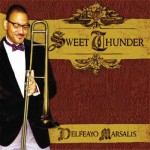Duke Ellington composed music covering an extraordinary range of themes. His 12-song suite Such Sweet Thunder is not among his better-known works, but it is a beautiful and thoughtful piece of music that possesses all the coloration, dynamics and swing that Ellington is known for. Delfeayo Marsalis has been fascinated with this work for years and his interpretation of the work, Sweet Thunder, is the result of meticulous scholarship and practice, including a live performance of the suite that helped him understand the ways it could be shaped. The impressive packaging of this album contains detailed annotation and commentary, the most provocative of which comes from jazz theorist and composer Gunther Schuller, who argues that Ellington is beyond interpretation. Schuller suggests that any interpretation of Ellington’s music cheapens it, yet Marsalis answers this challenge with the equally convincing argument that Such Sweet Thunder was designed by Ellington as a kind of blueprint to be explored by others. In his research, Marsalis discovered that Ellington’s original score was different from the final recording, so he adapted his version from both sources.
Marsalis achieves the remarkable feat of maintaining fidelity to Ellington’s creation while altering it in subtle and wonderful ways. Several pieces, particularly the sonnets, are organized very closely to the original arrangements, but others are opened up dramatically. “Circle of Fourths” is expanded in scope to the point where it becomes the finale of the suite in the Marsalis version. Delfeayo is mindful of the players he’s working with, taking a cue from Ellington, who wrote parts with the strengths of his band members in mind. “Up & Down, Up & Down” was originally a vehicle for Clark Terry’s trumpet, but here Marsalis uses Victor Goines on soprano sax to portray the impish Puck. On “Madness in Great Ones,” Delfeayo’s trombone is the “voice of reason” arguing with the increasingly unhinged Goines on sopranino sax. On “Sonnet for Sister Kate,” Ellington’s piano intro is replaced by Jason Marshall’s bass clarinet.
Marsalis gets top performances out of two of his siblings on the set. Jason’s drumming is superb, particularly in setting the mood on “Sonnet for Sister Kate” and on his “Sonnet in Search of a Moor” solo. Branford Marsalis is outstanding on soprano, putting his unique, improvisational stamp on the defining solos in “Sonnet for Caesar” and the Cleopatra piece, “Half the Fun.” Delfeayo himself is key to the proceedings, of course, playing strategic parts that don’t always call attention to themselves but flourish when the dynamics of the piece call for it. His ability to move easily and out of Ellington’s framework by following the clues Ellington left is the key to Sweet Thunder’s success.





